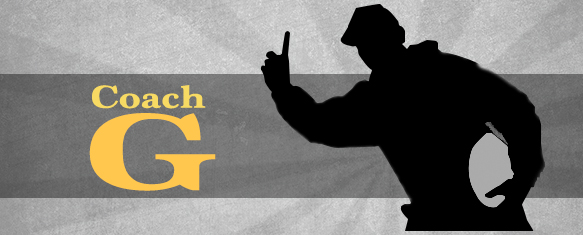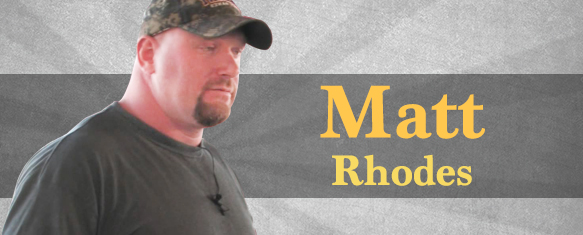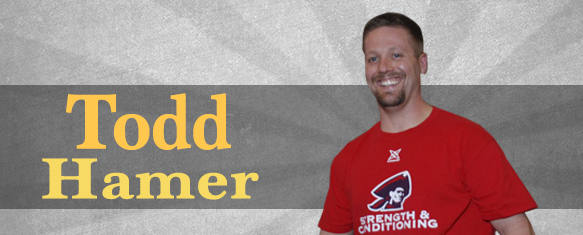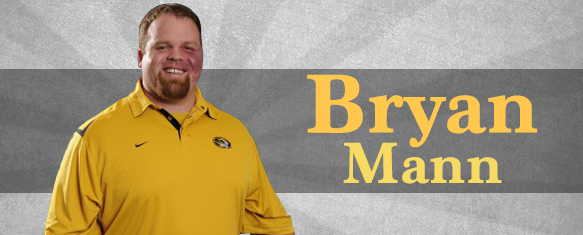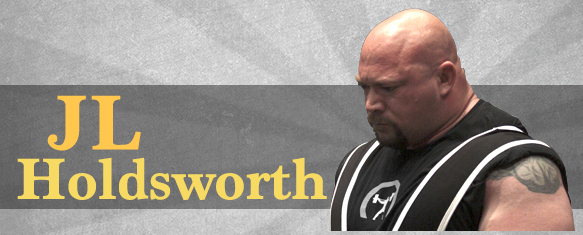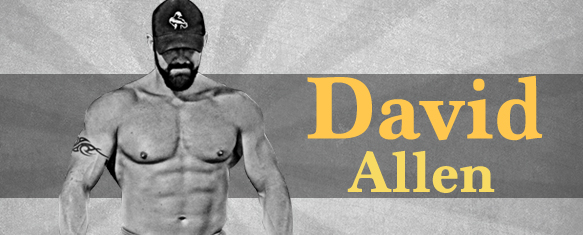
Our motto at elitefts is Live, Learn, Pass On. Therefore we find it necessary to interview and pick the brains of the world’s smartest strength and performance coaches. We greatly appreciate the responses from every coach and enjoy sharing their knowledge, along with ours, with all our viewers. elitefts allows interns to embark on this interviewing experience by having them create a coaching roundtable.
Hunter Winans is a rising senior at Denison University, member of the football team, and current intern for elitefts.com. The questions asked in this interview contained two main themes: relationships with coaches and scheduling conflicts. These questions were discussed with both collegiate strength and conditioning coaches and performance coaches within the private sector. Each coach gives a unique answer to each question.
Strength and Conditioning Coaches
- Coach G (UMASS)
- Coach Matt Rhodes (Moorehead State)
- Coach Todd Hamer (RMU)
- Coach Bryan Mann (Missouri)
Performance Coaches
Strength and Conditioning Coach Questions
As a strength and conditioning coach, how is your relationship with the head coach? How does that relationship affect the scenario of the two of you having different training program ideas in regards to the health and athletic performance of the team as a whole?
How do you deal with scheduling conflicts while, most likely, on a limited time schedule? Are these scheduling conflicts usually with the other varsity teams in the weight room, or with players having academic conflicts?
S&C Coach Answers
My relationship with our head coach is very good. It is at a very professional level. He has coached in the NFL, and treats me, and what we do, as such. He just lets me do my job and really doesn't give any input — he likes guys to do the job they are hired to do. He is most proactive when we are in camp or in season. We are constantly working together on when to push the athletes, and when they need to recover. It has been a great working relationship.
As far as scheduling, we are very fortunate here. We moved into a new football only facility; our weight room is exclusively for our football players. We are very lucky in that aspect. We just fit their schedule around their academics.
The head football coach hired me because he trusts me to get his team ready. He gives me free reign to get his athletes prepared mentally and physically. If we have a difference in opinion about training methods, he yields to my experience and knowledge. It's a great situation for me.
I have had some differences with other sport coaches. Ultimately, it's my job to be able to explain to them why I want to do everything in my program. After that is explained, the head sport coach has final say and I will always yield to that. When the boss says they don't want something, you listen. It's the sport coach's job and record that are at stake, not mine.
Scheduling is a first come, first serve situation. We have limited space. However, football and men's basketball always get first preference. If they decide on a time that has been taken, the other team has to be moved. It's not fair, but that's how it works. Football has 100 guys so they need the space. They also NEVER change their times. Once they're scheduled, it's set. Men's basketball is the same. Once they are scheduled, it's set.
The other criteria I use is that sports’ dedication to the weight room. You get some coaches who say the weight room is important, but that's the first thing cancelled if they need extra practice time. The teams that show dedication to the weight room will get preferential treatment. Everyone wants the same times. The teams that are committed get those times. This takes some time getting to know the coaches, and watching their habits.
Academic conflicts always take precedence. After all, they're in school to get an education. Once their schedule is set we, set a specific time for them to come in and get their work done. It's not a come as you feel situation.
As for coaches, I deal hands on with three (we oversee many more but these are the three I have), each coach being different. My women's basketball coach has openly admitted that he has no idea what I do and he trusts me to do it.This is good and bad. Good because I can just do my work with that team; bad because the coach does not always understand the importance of what we are doing. But I do have a great relationship with this coach and he allows me to do 99% of what I want with the team.
My men's basketball coach takes a much more hands-on approach. He wants to make sure his guys are working hard and he believes 100% in hard work first. He comes to every lift that he can (about 80%). At times he will bring a new idea, we will talk through it, and come to a team conclusion. This is good because once we decide on something we do it 100%.
The last team I will discuss is football. Our staff let's me do whatever I want as long as the guys hit the numbers we agree on before the cycle starts. In other words, we meet, discuss the goals, and then it is my job to reach those goals. Again, I have a ton of freedom with some input from the coaches.
With these three teams, there are rarely any major issues that we disagree on. Basically I have goals to reach and it is my job to get the athletes to reach these goals. As long as I do my job and do it to the best of my abilities then my coaches are good with what we are doing.
Scheduling is a touchy issue at Robert Morris University. We have one weight room and can get 250 athletes through on a busy day. As for team issues: I try to make all coaches happy, but I always have someone unhappy, and part of my job is to minimize this. As long as a team doesn't want to change times from last year, we let it go. If we have changes, I try to move the team as best as I can. One way I do this is: I know I can always move a football group due to the amount of athletes. What I mean by this is if I have football scheduled at 7, 8, 9 and 10, and a team wants ten, I'll pull football schedules. If I can get all athletes through by moving 10 to 11, then I do this. If not, then I keep trying. As for academic issues, we rarely have a team in the weight room without at least one or two other athletes who had a conflict from a different team. Also, working for a small school means that I know everyone so I know what an athlete really has academically. If there is an issue, I can find out why.
I'm just a strength and conditioning coach at Missouri. The relationship with the head coach is everything. If the head coach doesn't trust you, you are not going to last long in your position. If you have anything new, you won't be able to try it. You will be stuck doing pretty much whatever the head coach wants to do. I can go back to the beginning of my tenure with soccer in 2004: When I met with the head soccer coach I had to talk about, explain, and lobby for any change in the program I wanted to make. A few years later I would go up to him and say, "Coach, I have an idea..." and he would stop me and say, "You do a great job. Whatever your idea is, do it, and tell me how it worked later."
Conflicts are really both. We have over 500 athletes training in one weight room for the most part. We have to schedule based on a variety of factors:
- Size of the team
- Historical schedule. Track has had the same time slot since about 1980. They have their time slot no matter who else wants it.
- Off-season takes priority for us as that's when we have the most impact. In-season I've done on-the-field or indoors with med-balls and trap bars
Performance Coach Questions
As a performance coach in the private sector, do you have a relationship with the head coach, or any coach, of your clients? How does that relationship (or lack of) affect the scenario of the two of you having different training program ideas in regards to the health and athletic performance of the athlete?
How do you deal with scheduling conflicts while, most likely, on a limited time schedule?
Performance Coach Answers
I try to meet with all the head coaches of my athletes. There are a lot of bad trainers out there and I want my athletes’ coaches to know that they are dealing with a really good strength coach, not just some douche who got his weekend certification last month. I find that this gives the athletes more room to adjust what they are doing or are required to do at the school.
Most coaches will listen to me when it comes to programming suggestions but some are stuck in their way and won't change. I would say though that 75-85% of coaches that I talk to change some of the things that I suggest for their program.
It is difficult however as some athletes, mostly football players, are required to train four days per week at the school. This usually leaves us with a lot of dynamic and S.A.Q. (speed, agility, and quickness) work to do. I also don't see a lot of heavy carries in high school programs so this is something we always incorporate with our football players who train four days at school and come see us two days per week.
The one thing we always tell our athletes is that no matter what they learn at our facility, never question their head coach. We have seen some pretty stupid things over the years but if an athlete questions the coach and says they learned differently from us, that puts us in a bad spot. A few years ago a volleyball player of ours who was very smart got into an argument with her coach about how running two miles every day was an awful way to get in shape for volleyball because it is using the wrong energy systems. We ended up talking to the coach and she said she liked her way of doing things but then two weeks later, she changed her whole conditioning program. The problem was that the player was treated like crap the entire year for making the coach look bad.
We offer many times for training so we don't really have too many conflicts. The athletes get on a schedule and it may change from season to season, but overall it isn't an issue. Football players utilize Sundays during the season to train with us, and since we have training every day of the week, it's not much of an issue.
The bigger issue is athletes who are in multiple sports at the same time. We have a football player right now who is in basketball; the football coach requires four days per week, and the basketball coach wants three days per week. This leaves us with very little time, and an athlete who doesn’t have much to give when he comes into the facility. Summer is sometimes the craziest for scheduling due to all the requirements of multi-sport athletes during the summer.
The bottom line is: coaches realize that training makes better players. Unfortunately, most of them have no clue what they are doing. Sometimes this means no performance gains, and other times it means the injury of players.
With many of my high school athletes, I try to reach out and establish contact with their coach at some point. Some coaches are open to relationships and others are not. I want the coach to know that my interest is in helping him or her develop the athlete to the best of his/her potential. I think it is important that some level of understanding must be created between all of an athlete’s coaches sports coaches and trainers instead of everyone trying to get their share in.
Unfortunately, most of the time the sport coach is far less willing to compromise on their program than I am on mine. Many times the athlete is required to be at all team workouts for participation. If this is the case, our workouts tend to be “gap fillers” or fixing incorrect form, injuries, etc., that might have occurred from the team training session.
In other scenarios, the coach is fine with the athlete doing all their training with me, or at least a good part of it. This is why I try to reach out to all sports coaches beforehand. In the end, I don’t decide who is going to play and who won’t and I don’t ever want an athlete to miss playing time because they pissed a coach off by coming to me instead of their team workout.
Scheduling conflicts depend on the situation. There can be a lot of compromise with the athlete and the coach. For example, I had a swimmer who’s coach wanted him to taper his weight training in preparation for a meet. Normally, they would drop out all weight training a couple weeks before. I explained that this was a bad idea; I didn’t want the athlete’s strength to decline over several weeks and him go into the contest weaker. So we kept the main strength movements and dropped any volume work done in the accessories. The athlete ended up having his best meet yet. Once an athlete and a coach sees you know what you are talking about and can help them, they are more likely to let you do your thing. Like I said earlier, if they are doing both workouts, our workouts usually become “gap fillers” and technique work. This is usually a lot of posterior chain work and main movements with lightened loads. Rarely will I condition the athlete because they do so much of it at school anyways.
Conclusion
Luckily for our strength and conditioning coaches who participated in this roundtable, they seemed to overall be very happy in their respective situations. By that, they are respected enough, and trusted enough, by the head coaches to be able to perform their jobs exceptionally. There is reasoning behind all the madness and intensity of every one of their programs, for all the sports teams they are responsible for.
In any case, I learned that if you and the head coach disagree on anything, you must listen to the head coach. It is their job, and their record that is on the line every season. That is not to say you can still implement some of your own ideas, and tweak the original program slightly, to make it your own. As long as their is a reason to do so, and the athletes benefit from their training sessions, then you are accomplishing your job.
On the scheduling aspect, academics are always the priority. It may not really seem so to some of us fans of Division I college football, but the athletes always need to maintain a certain GPA requirement in order to keep playing their sports.
I was very pleased to learn that performance coaches in the private sector reach out to their athletes head and/or strength coaches. They do this in order to know exactly what type of training the athlete is in; the last thing a coach would want to do is over train an athlete, especially to the point of injury. It is the job of the performance coach to adapt to their athletes' schedules and enhance their athletes' goals by building off of what they are already doing in their programs.









